 MyDogBreeds
MyDogBreeds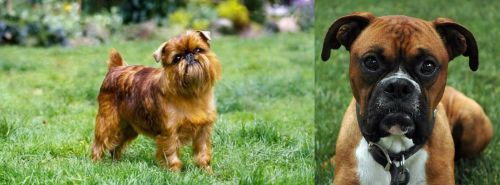 Belgian Griffon is originated from Belgium but Boxer is originated from Germany. Belgian Griffon may grow 43 cm / 16 inches shorter than Boxer. Belgian Griffon may weigh 26 kg / 57 pounds lesser than Boxer. Both Belgian Griffon and Boxer has same life span. Belgian Griffon may have less litter size than Boxer. Belgian Griffon requires Moderate maintenance. But Boxer requires Low maintenance
Belgian Griffon is originated from Belgium but Boxer is originated from Germany. Belgian Griffon may grow 43 cm / 16 inches shorter than Boxer. Belgian Griffon may weigh 26 kg / 57 pounds lesser than Boxer. Both Belgian Griffon and Boxer has same life span. Belgian Griffon may have less litter size than Boxer. Belgian Griffon requires Moderate maintenance. But Boxer requires Low maintenance
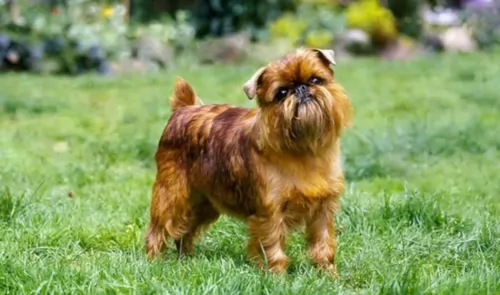 The Belgian Griffon isn’t your most attractive dog, but maybe its his quirky, gremlin looks that makes him such an adored pet for many. There are different varieties of Griffon, and the Belgian- and Brussels Griffon are one and the same. All small Belgian dogs have the same breed standards, with the Belgian having a rough coat The dog hails from Belguim and its ancestors were no doubt a mix of the Belgian street dog, the Stable Griffon and the Affenpinscher.
The Belgian Griffon isn’t your most attractive dog, but maybe its his quirky, gremlin looks that makes him such an adored pet for many. There are different varieties of Griffon, and the Belgian- and Brussels Griffon are one and the same. All small Belgian dogs have the same breed standards, with the Belgian having a rough coat The dog hails from Belguim and its ancestors were no doubt a mix of the Belgian street dog, the Stable Griffon and the Affenpinscher.
Later on in the 1800s, this combination was then crossed with the Pug, giving the dog the brachycephalic or flat faced look.
Unfortunately no written records were kept about the precise origin of this breed, but there is also the idea that the King Charles- and English Toy Spaniel were also involved in its development. These small dogs were bred to catch rats in the barns of European estates.
 In the late 19th century boxer was developed in Germany. It is a part of the Molosser dog group. The breed Brabanter Bullenbeisser is said to be the ancestor of the Boxer. He got the name Boxer as he stands with his back legs and does like a boxer do. In 1895 the breed came to a dog show by three germans named Friedrich Robert, Elard Konig and Hopner. In 1896 they founded the first boxer club as Deutscher Boxer Club. In 1902 the first Boxer breed standard was published by the club. The breed was introduced to United States in 20th century. The boxer involved in military work and also worked as a messenger dog. After 2nd world war they became popular as the soldiers brought them and introduced.
In the late 19th century boxer was developed in Germany. It is a part of the Molosser dog group. The breed Brabanter Bullenbeisser is said to be the ancestor of the Boxer. He got the name Boxer as he stands with his back legs and does like a boxer do. In 1895 the breed came to a dog show by three germans named Friedrich Robert, Elard Konig and Hopner. In 1896 they founded the first boxer club as Deutscher Boxer Club. In 1902 the first Boxer breed standard was published by the club. The breed was introduced to United States in 20th century. The boxer involved in military work and also worked as a messenger dog. After 2nd world war they became popular as the soldiers brought them and introduced.
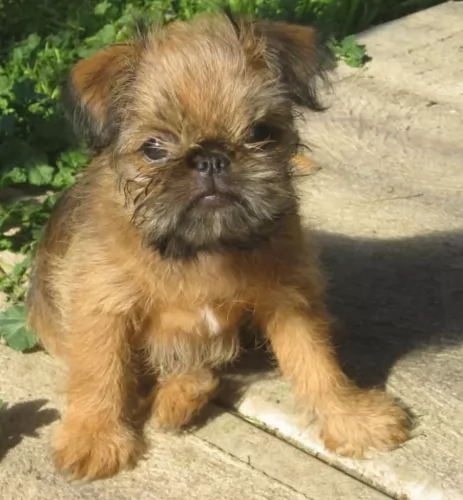 There are different variations of this dog to give it its distinctive look and size. This quaint looking little Griffon canine comes with two different coat types - soft or wiry. With the Belgian Griffon, his wiry coat of red, tan or black will need to be brushed at least twice a week. Shedding with this dog is seasonal.
There are different variations of this dog to give it its distinctive look and size. This quaint looking little Griffon canine comes with two different coat types - soft or wiry. With the Belgian Griffon, his wiry coat of red, tan or black will need to be brushed at least twice a week. Shedding with this dog is seasonal.
He has a compact, sturdy little body, and he trots around with attitude. With his sharp pointed ears and whiskers, he has been given the nickname ‘bearded dog’. His dark black eyes are alert. He is self-confident, intelligent and curious breed, a great family pet and good with children if he has grown up with them in the home. He is good with other pets. The fact that this is a small breed and that he doesn’t have excessive energy levels, means he is adaptable to city- and country living.
 Boxer is a breed which is medium in size and has short hair. They have very strong jaws as to hunt large prey even hanging on biting them. It belongs to the working group. Boxers are well known for their love and faithfullness. Also he is very intelligent and its cleanliness makes him to be good dog for home. They are very energetic and are playful in nature. When boxers where trained by giving reward to them it is sure that they will perform its best. Normally they like to have good companionship with humans and smaller dogs.
Boxer is a breed which is medium in size and has short hair. They have very strong jaws as to hunt large prey even hanging on biting them. It belongs to the working group. Boxers are well known for their love and faithfullness. Also he is very intelligent and its cleanliness makes him to be good dog for home. They are very energetic and are playful in nature. When boxers where trained by giving reward to them it is sure that they will perform its best. Normally they like to have good companionship with humans and smaller dogs.
They are incredible in their alertness and well suitable for watchdog. Boxers will be playful and silly till 3 years as they will mature after that only. They require only a minimum amount of grooming. They are suitable for apartment living until they are with their owners. Boxer owners will be sure to enjoy its clownish behaviour. They will be excited many time and show that by spinning in circles and making a sound which the owner will understand that he is happy or he needs some thing which is in the hands of his owner.
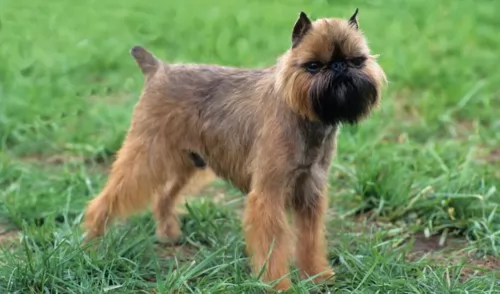 The Belgian Griffon is an affectionate pet and often establishes a strong bond with one member of the family. You’ll have your Griffon with you for about 15 years so make sure he is trained and a pleasure to have around.They are difficult to train, being somewhat stubborn so they are going to require patience. They’re sensitive too, and they won’t respond well to aggressive treatment.
The Belgian Griffon is an affectionate pet and often establishes a strong bond with one member of the family. You’ll have your Griffon with you for about 15 years so make sure he is trained and a pleasure to have around.They are difficult to train, being somewhat stubborn so they are going to require patience. They’re sensitive too, and they won’t respond well to aggressive treatment.
They’re much more indoor dogs than outdoor dogs because they’re also vulnerable to heat stroke. They just want to come indoors and be with their human family, and when you do that for them, they’ll become a wonderful friend and companion to you.
 They are good kid friendly dogs. He is famous for his alertness and thus a wonderful watchdog. He loves to play with children. The nature of dog varies according to the heredity and society. The temperaments of the parents will effect in the puppy. Boxer is a friendly companion and loves to be with its family all the time and play with them.
They are good kid friendly dogs. He is famous for his alertness and thus a wonderful watchdog. He loves to play with children. The nature of dog varies according to the heredity and society. The temperaments of the parents will effect in the puppy. Boxer is a friendly companion and loves to be with its family all the time and play with them.
Boxers are good for apartment living provided they are taken for a walk and exercised daily. It will be good if anyone stays with him always since he doesn't like being alone. He should be taken out only in a moderate weather as both hot and cold weather cannot be tolerated by him. He will suffer a lot in hot weather when compared with cold.
Training is necessary for them to refreshed physically and mentally. Boxer is a quick learner and rewarding them will make them more interested in doing it. Training should be started from basic commands like sit, stay and come. Boxer should be trained to not jump on visitors who come. They are very energetic and powerful and are eager to learn if properly taught.
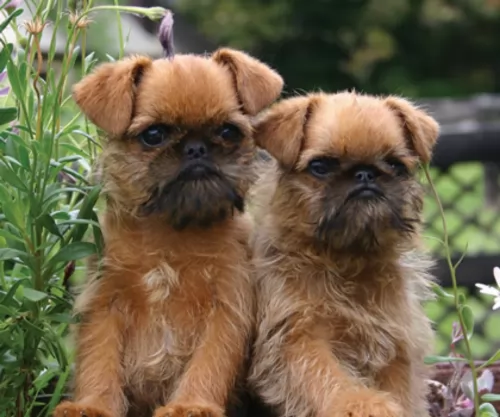 When you get your Griffon from a reputable breeder, you always have a better chance that he’ll be healthy. As it is, the Belgian Griffon has few hereditary health issues. However his dark eyes will have some genetic problems to contend with and he could suffer with progressive retinal atrophy. This is an illness which can lead to blindness
When you get your Griffon from a reputable breeder, you always have a better chance that he’ll be healthy. As it is, the Belgian Griffon has few hereditary health issues. However his dark eyes will have some genetic problems to contend with and he could suffer with progressive retinal atrophy. This is an illness which can lead to blindness
Syringomyelia – this is a neurological condition – an abnormality of the spinal cord – a disease which occurs more frequently in small breeds. It can cause your pet to endure a lot of pain.
Birthing Issues - these little dogs often have problems with giving birth, and a vet often has to intervene and perform a cesarean.
 The major health problems Boxers get includes Cancer, heart problems such as Aortic stenosis, Gastric dilatation and intestinal problems. Infection is the major problem in puppies. Boxers are also in a risk of getting degenerative myelopathy which is a neurologic problem. Allergies and skin problems are also a problem in them. It is difficult to recognize a growing puppy to be free from all diseases and the only thing we can do is to buy the puppy from a reputable breeder.
The major health problems Boxers get includes Cancer, heart problems such as Aortic stenosis, Gastric dilatation and intestinal problems. Infection is the major problem in puppies. Boxers are also in a risk of getting degenerative myelopathy which is a neurologic problem. Allergies and skin problems are also a problem in them. It is difficult to recognize a growing puppy to be free from all diseases and the only thing we can do is to buy the puppy from a reputable breeder.
Boxers may lose their hair due to some diseases and conditions. When some materials such as nickel, rubber and wool are accidentally touched by them it may cause allergies and hairfall follows it. Some auto immune disorders leads to hairfall. Due to some inhalation of pollen or house dust the problem may happen. Some bacterial infection and hormonal problems may also leads to hairfall.
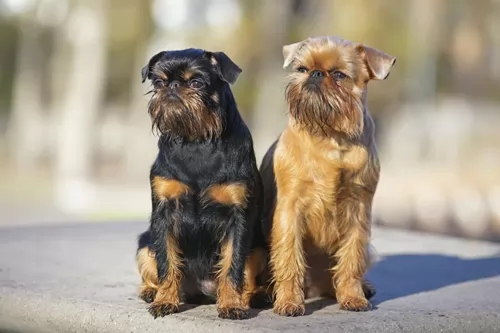 The Belgian Griffon will do well if you invest in high quality foods. You can make your own, but if you’re concerned about his health, it would be best to check what ingredients should go into his home-prepared meals to ensure he gets all the vitamins and minerals he needs.
The Belgian Griffon will do well if you invest in high quality foods. You can make your own, but if you’re concerned about his health, it would be best to check what ingredients should go into his home-prepared meals to ensure he gets all the vitamins and minerals he needs.
If you want to go with commercially manufactured dog foods, check with your vet about wet- and dry foods. Your vet will help with choosing a food appropriate to his size and age. Always ensure that there is clean, fresh water available to your pet.
Even though he is a small breed, he is fairly active and he will need his fair share of exercise like ball games and walks. Training and socialization are a must for him. You’ll notice that training isn’t particularly easy with this breed, and first time dog owners might not have the patience with him.
 Normally puppies require more food than adults to meet their energy requirement for growth. They should be fed in a correct time interval. The puppy food for large dogs must be chosen for their health. Boxer puppies must be fed twice in a day and two cups of food will be better for them for one time. Upto 6 months this method is recommended. Feeding them by dividing the meals into smaller portion will be good since they will eat too much and very fast. Weight of the puppy should be checked regularly and food should be given according to that.
Normally puppies require more food than adults to meet their energy requirement for growth. They should be fed in a correct time interval. The puppy food for large dogs must be chosen for their health. Boxer puppies must be fed twice in a day and two cups of food will be better for them for one time. Upto 6 months this method is recommended. Feeding them by dividing the meals into smaller portion will be good since they will eat too much and very fast. Weight of the puppy should be checked regularly and food should be given according to that.
The food given to the boxer will effect in the dog's health and its life span too. Also it should match our budget also. Overfeeding will make them overweight and thus bringing harm to them. It is recommended to feed boxer two times a day to avoid bloat. Food should be given such that the dog completely eats it and if they can't eat completely then the balance food must be thrown away to avoid over eating. They should not be given food while we eat even once as it will develop begging behaviour in them.
Boxers are not suitable for living in outdoors, since they have short coats and short noses. But they like to play in a fenced yard. It is recommended to make them walk for half an hour twice a day. Playing flyball with them will make them happy and making him exercised will give him a good behaviour.